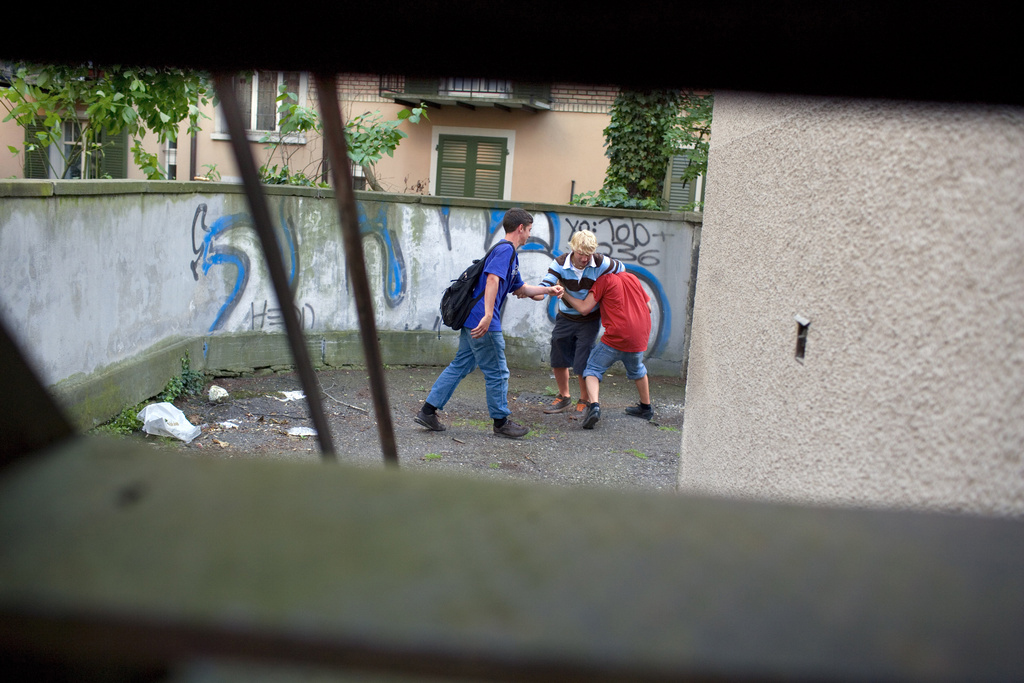Most criminal teens had troubled childhoods

As the trial of Swiss teens accused of attacking strangers in Germany resumes later this month, researchers have taken a new look at youths who use extreme violence.
A Zurich University study has analysed for the first time in Switzerland the court-ordered psychiatric evaluations of teenagers convicted of murder, rape and other serious crimes to see what patterns might exist and what can be done.
“We wondered what kind of juveniles these kids are,” Cornelia Bessler, leader of the report at the university’s department of child and adolescent psychiatry, told swissinfo.ch.
She said the analysis shows teens are most at risk for committing a serious crime when they are between 15 and 17 years old. Two-thirds of the 106 adolescents studied were between those ages when a court ordered them to undergo a psychiatric evaluation after a serious offence.
Perhaps more disturbing is that one out of four youths who underwent the evaluations had already begun to break the law before they had turned 14. The crimes often only grew worse.
“If you get hurt, if you are a victim, it makes you angry and you want to see someone punished,” Bessler said. “I understand that, but this doesn’t help at all because often these youths get worse in jail. You have to treat them.”
In short, punishment can make delinquent youths more delinquent, she said.
Long history
The Swiss youths on trial in Munich were all 16 when they went on a 30-minute rampage while on a school trip, attacking five people, including a disabled person and an insurance salesman, whose face is reported to have “collapsed” in the attack. The teens all had previous convictions.
Manuel Eisner, a lecturer in sociology at Zurich University and the deputy director of Cambridge University’s institute of criminology, agreed that youths rarely commit a serious crime out of the blue. His findings echo Bessler’s report, which indicated that a majority of violent youths had already been in trouble as pre-schoolers.
“There’s often a long history that starts even in kindergarten,” Eisner told swissinfo.ch.
“Young people use force. They fight over toys and it isn’t problematic. Most stop. But there’s a small group that falls through the net, that gets more and more dangerous as they get older, gain strength, and alcohol and drugs come into the picture. The big question now is how does this group differs from all of the others.”
Bessler’s study did not attempt to answer that. Instead it set out to look at serious offenders from a statistical point of view.
Integrate, integrate, integrate
To complete the analysis Bessler and a team of six researchers looked at evaluations performed between 2004 and 2006 on youths who were ten to 18 years old.
Some of the themes that popped up were common: males from poor, abusive, uneducated families with immigrant backgrounds came up often in the reports. Others were more subtle. More offenders had mothers with no professional skills (75 per cent) than those who had fathers with few or no skills (68 per cent).
Almost half of the criminals studied were not Swiss, with about one-quarter having families from the former Yugoslavia. Eisner, who did not take part in the analysis, said “a negative feedback loop”, with discrimination and stigmatisation, often leads to “self-fulfilling stereotypes” among Balkan youth.
But Bessler says the analysis should serve more as a call to society to think about how we deal with young people who commit cruel crimes.
“If these young people get in jail and they don’t get better, they lose the opportunity to integrate,” she said.
“They have to be punished. They have to feel society’s reaction to what they did. But they have to have the chance to be integrated.”
And that means society has to look at the youths’ families and discuss ways to support them, their relationships and helping them with jobs and education, she said.
“It’s another direction and opportunity,” she said.
Tim Neville, swissinfo.ch
Three 16-year-olds from canton Zurich appeared in a Munich youth court during the second week of March.
Their next hearing is on March 29. Hearings have also been scheduled for April.
They have been charged with attempted murder and grievous bodily harm in connection with the July 2009 attacks.
They all have criminal records in Switzerland.
One was sentenced for theft and unlawful entry, another for inflicting bodily harm and the third for assault and attempted robbery.
All three received community service of between nine days and four weeks for their crimes. One was ordered to undergo therapy in September 2008.
They are accused of attacking three unemployed men in Munich’s old city in the early hours of July 1.
Afterwards they nearly beat a German businessman to death. On the way home they attacked a student.
The teenagers had drunk alcohol and smoked a joint beforehand.
According to a Federal Police Office report, there are around 500 young serious and repeat offenders in Switzerland.
Most are said to be young men with immigration backgrounds – most commonly from the Balkans and Turkey – who often join ethnically mixed gangs. They have difficult relationships with their family, school, work and drugs.
In French-speaking Switzerland, police also talk of problems with people from north Africa and other countries in Africa.
Female gangs appear to be an exception. One area that is not disputed by experts is the qualitative shift in youth criminality in recent years – above all, the increased viciousness of attacks and the increased intensity of delinquency by individuals.

In compliance with the JTI standards
More: SWI swissinfo.ch certified by the Journalism Trust Initiative














You can find an overview of ongoing debates with our journalists here . Please join us!
If you want to start a conversation about a topic raised in this article or want to report factual errors, email us at english@swissinfo.ch.